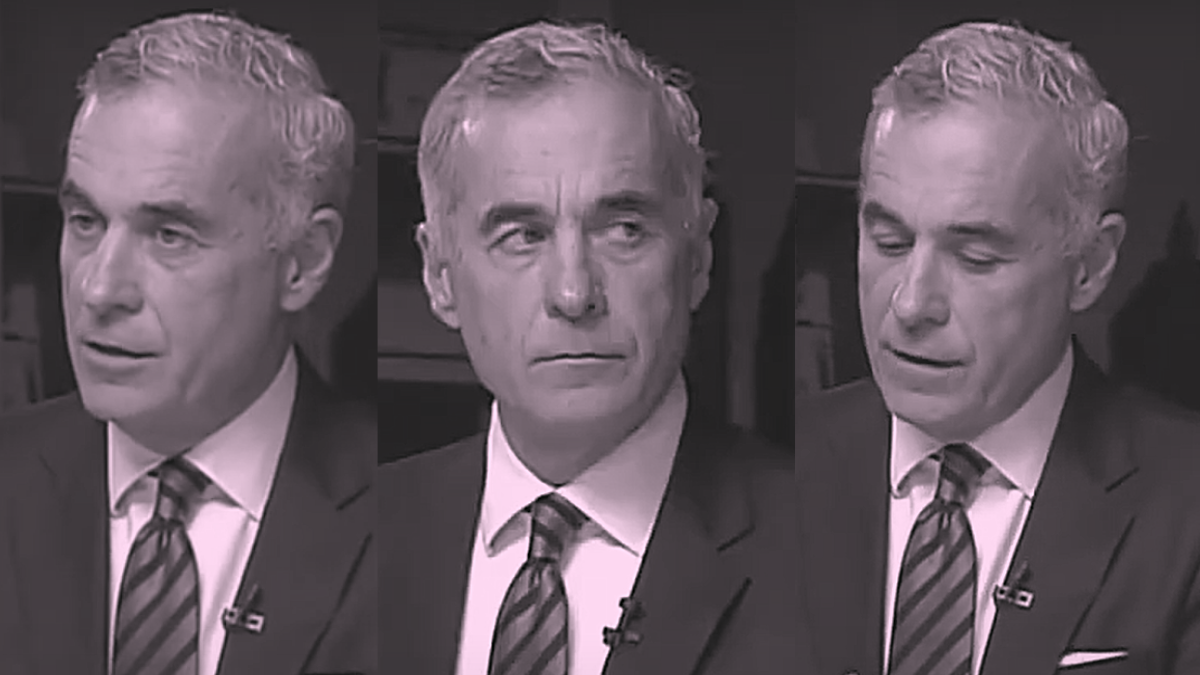TikTok's Role in Romania's Election Should Be a Wake-Up Call
Felix Kartte / Dec 13, 2024
A composite of images of Călin Georgescu in an interview at Realitatea TV in 2022. Wikimedia
In Romania, a man who disdains the EU, NATO, and democratic freedoms was on the brink of becoming president. The government annulled the first round of the presidential election, but Călin Georgescu’s shocking rise is sending ripples through Brussels. Not because of his extremist views but because of how he rose. It’s that his ascent happened almost entirely outside the established media's sight – engineered instead with significant assistance from TikTok networks glorifying his personality cult and ideology.
This phenomenon reflects a new reality—a dark, fascist-leaning world cultivated on social media, beyond the control or comprehension of traditional democratic actors. The EU, with its commitment to old-school politics, is blindsided by this alternate reality, one that rewrites norms to suit authoritarian objectives. Violence becomes strength, robbery is reform, and accountability is weakness.
A global, well-funded assault on democratic norms is reshaping reality, orchestrated by authoritarians and tech oligarchs alike. This assault centers on destroying the media and proceeds in three strikes.
The first strike is defamation. Authoritarians vilify journalists, calling them “enemies of the people” or corrupt elites. They repeat this lie until it feels true to significant audiences. Ahead of the recent US election, the campaign against the media waged by President-elect Donald Trump, Elon Musk, and other MAGA elites echoed Russia’s model of networked propaganda. They shared countless posts attacking the media, racking up billions of views. This rhetoric trickles down through influencers, essentially paid trolls, creating an ecosystem of distrust.
The second strike is substitution. Having dismantled trust in the media, authoritarians fill the void with influencers and pseudo-journalists spreading their authoritarian worldview. Musk uses his cult-like status on X to incentivize influencers who adopt his extreme narratives, selectively amplifying their reach. MAGA donors and the Kremlin fund similar efforts globally. In the US, Russian-sponsored YouTube influencers pushed conspiracies ahead of last month’s election.
According to Pew Research, one in four young people in the US now cite influencers as their primary news source. The job of these influencers is not to deliver facts or “alternative facts” but to reshape societal norms, blending memes and lifestyle content with ethnic nationalism and misogyny. On TikTok or YouTube, they present themselves as relatable peers while telling young boys to despise their own vulnerability and to hate their teachers. “We are the media now,” a young German far-right influencer proclaimed last week on X, echoing Musk’s own line.
The third assault is silencing. Authoritarians don’t just flood the zone with propaganda—they actively suppress scrutiny of their tactics. In the US, Musk and Trump’s allies have targeted researchers investigating disinformation, filing lawsuits, and pushing legislative probes to intimidate critics. The chilling effect is real: organizations like the Stanford Internet Observatory now face mounting legal costs and shrinking capacity to expose propaganda networks. They attempt to work their bullying tactics on regulators, too. JD Vance has threatened that the US might withdraw from NATO if Europe were to enforce its platform rules, the Digital Services Act, against Musk’s X. The law is key to enhancing the transparency of platforms and enabling researchers to study authoritarian tactics.
This authoritarian assault is working. The strategy is building “separate realities,” dividing societies not just by information but by fundamental norms. In one reality, democracy continues; in the other, extremism thrives unchecked, reframing democratic rules as tyranny. Like a cult, this new reality recruits new members at mind-boggling speed.
What makes this moment particularly alarming is the convergence of interests between tech oligarchs and authoritarian politicians. Platforms like Google and Facebook have already gutted journalism by siphoning away advertising revenue, creating news deserts across much of the democratic world. Now, platforms harvest journalism to train AI without fair compensation while throttling news links and strong-arming publishers.
Figures like Musk are taking it further, aligning their platforms with authoritarian agendas. Jeff Bezos’s intervention in the Washington Post’s planned endorsement of Vice President Kamala Harris in the 2024 election and Meta CEO and founder Mark Zuckerberg’s attempts to win favor with President-elect Trump may signal a deepening alliance between tech giants and authoritarian politics.
In a world shaped by these authoritarian-tech alliances, democratic parties may have difficulty winning elections. In Germany, Musk has already amplified far-right influencers and far-right AfD politicians ahead of February’s national vote.
The center-right CDU is likely to win by a significant margin, with far-right AfD expected to secure second place. However, the CDU’s real challenges will begin once it’s in government. Thus far, extremist attacks have primarily targeted the Greens for their focus on climate and diversity. But in opposition, the AfD will pivot, branding the CDU as the scapegoat for economic downturn and migration-induced anxiety, framing them as merely a slightly more "male” version of the Greens.
AfD has already declared its aim to seize power in the 2029 election. Their dominance in the transformed media landscape will bolster this quest, as their social media reach and influencer networks far outstrip those of any other party.
Across other nations, such as France, Hungary, and Israel, traditional center-right parties have either collapsed or radicalized under extremist pressure. If the AfD succeeds in its long-term goal to govern Germany, with its explicit anti-EU agenda, the authoritarian assault on democratic norms in Europe could reach a critical tipping point.
As the new European Commission under President Ursula von der Leyen takes office, it must act decisively. Pushing out fact sheets about the EU’s successes won’t stop this tide. Instead, the EU must unify against figures like Musk and Trump, fully enforce digital rules such as the Digital Services Act, and break Big Tech's stranglehold on media and AI. The announcement of a probe into TikTok’s role in Romania is welcome news. But Europe must also learn to communicate within these new media realities, crafting narratives that resonate with the existential fears and needs of audiences lost to the echo chambers of TikTok and X.
This is not just a battle for Europe's future—it’s a battle for the very concept of democratic reality. If Europe fails to defend it, we risk waking up in a world where authoritarians rule unchallenged, with Big Tech as their willing enabler.
Related Reading
Authors
